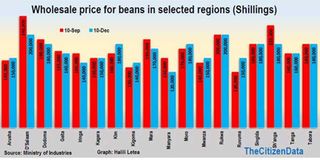Beans prices decrease in Dar es Salaam

What you need to know:
- The wholesale price of beans has remained relatively stable in the past three months with some regions experiencing slight increase.
Dar es Salaam. Prices of beans fell slightly in October compared with the previous month in Dar es Salaam.
However, the prices remained stable upcountry.
Weekly reports by the Ministry of Industry, Trade and Investment show that the wholesale price of a 100-kilo bag of beans was Sh171,875 on October 10, down from Sh173,409.09 on September 10.
In Dar es Salaam, prices were between Sh170,000 and Sh200,000 on December 10, lower than Sh170,000 and Sh240,000 on September 10, depending on varieties of beans.
A survey by The Citizen has also established that the average retail price of beans decreased to Sh2,200 on October 10, down from Sh2,500 on September 10.
Tandika Grains Agency chairman Peter Sospeter said prices might increase during the festive season as demand was expected to rise.
The Bank of Tanzania’s economic review for October shows that wholesale prices for beans decreased to an average price of Sh154,304.1 on September 30, 2018 from Sh172,795 during a similar period in 2017.
Kagera is the leading producer of beans on Mainland Tanzania, followed by Kigoma and Manyara.
According to FAO, beans, lentils, peas and other pulses typically contain about twice the amount of protein found in whole grain cereals. When combined with food high in vitamin C, pulses’ high iron content makes them a potent food for replenishing iron stores, particularly for women at reproductive age, who are more at risk from iron deficiency anaemia.




